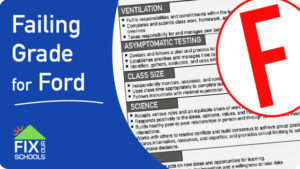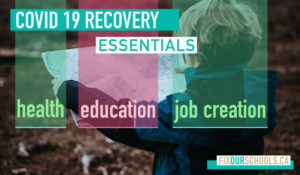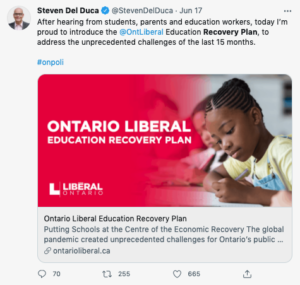The Organization for Economic Co-operation and Development (OECD) recently took a deep dive into the state of school education one year into the COVID-19 pandemic. A strong, yet imperfect, relationship emerged between how countries historically value education and how frequently schools have been shut down to in-person learning during the pandemic.
 Ontario has had repeated and prolonged school closures since the start of the pandemic. Students lost approximately 70 days of in-person learning in 2020, and have lost another 65 days of in-person schooling in the Greater Toronto Area in 2021. Given the OECD research, perhaps this speaks to a general lack of regard for publicly funded education and schools in this province. At Fix Our Schools, we certainly believe that Premier Ford and Minister Lecce have consistently failed to prioritize Ontario’s children, their schools and education, and their mental health. This failure may emerge as a “generational catastrophe”, according to Stefania Giannini, the top education specialist at UNESCO (United Nations Educational, Scientific and Cultural Organization).
Ontario has had repeated and prolonged school closures since the start of the pandemic. Students lost approximately 70 days of in-person learning in 2020, and have lost another 65 days of in-person schooling in the Greater Toronto Area in 2021. Given the OECD research, perhaps this speaks to a general lack of regard for publicly funded education and schools in this province. At Fix Our Schools, we certainly believe that Premier Ford and Minister Lecce have consistently failed to prioritize Ontario’s children, their schools and education, and their mental health. This failure may emerge as a “generational catastrophe”, according to Stefania Giannini, the top education specialist at UNESCO (United Nations Educational, Scientific and Cultural Organization).
 In a CBC interview on The House, Giannini said that about 90% of the global student population has been impacted by school closures during the pandemic and that, “the UN has warned that unless education is prioritized, the world could be facing a “generational catastrophe.” She urges governments to “think of education as a third pillar — along with health and job creation — that’s needed to end and recover from the COVID-19 crisis.”
In a CBC interview on The House, Giannini said that about 90% of the global student population has been impacted by school closures during the pandemic and that, “the UN has warned that unless education is prioritized, the world could be facing a “generational catastrophe.” She urges governments to “think of education as a third pillar — along with health and job creation — that’s needed to end and recover from the COVID-19 crisis.”
Closer to home, several Ontario organizations are also ringing alarm bells that publicly funded education and schools absolutely must be a priority as we transition out of the COVID-19 pandemic:
- The Ontario Science Table wrote a letter to Premier Ford with advice informed, in part, by a research briefing from Wilfred Laurier University
- The Ontario Public School Boards’ Association (OPSBA) produced a discussion paper entitled Transitioning from the COVID-19 School Experience
Letter to Premier Ford from the Ontario Science Table, Released on May 29, 2021
The Wilfred Laurier research briefing confirms that the following significant harms to Ontario students have been caused by school closures. This research briefing also confirms that these harms have fallen most heavily on vulnerable populations such as students with lower socioeconomic backgrounds, racialized children and youth, newcomers, and students with disabilities:
- Substantial deterioration of mental health status among children and youth, which will present significant long-term challenges during our recovery from the pandemic.
- Reduction in school attendance and student achievement
- Loss of skills development and in lifetime earnings for Ontarians
- Reduction of social connections
- For some Ontarians, school closures meant missing meals and other critical health services.
Beyond the findings on the impact of COVID-19 on Ontario’s students, the research paper cited above also points to the “need for an explicit education recovery strategy that is informed by data and measurement. It also highlights a significant challenge for the province: there are extensive data gaps and there has been a lack of ongoing consistent evaluation over the last year, both of which are needed for effective evaluation and recovery”.
The letter to Premier Ford from the COVID-19 Science Table also contains a look to September and beyond. The letter states that “summer will provide an ideal time to make the whole school system even safer by continuing to improve ventilation in school buildings and by vaccinating students. Moreover, Ontario should now start developing recovery plans to address the long-term mental health, health and educational problems arising from COVID-19-related school closures. This will require investments.”
OPSBA Discussion Paper, Released on May 27, 2021
The OPSBA discussion paper is designed to elicit collaborative dialogue with education partners by identifying key questions to build on current observations, identify the need for further study, and to create a frame for a new vision for school. Recognizing the COVID-19 pandemic as “one of the great social and economic disruptors of our time, with widespread impact on one of society’s most traditional institutions – school”, OPSBA’s discussion paper states, “We can’t pretend this educational roller-coaster hasn’t left many students isolated, their parents stressed and some teachers on the brink of burnout. Nor can we ignore the fact low-income and racialized families were hit hardest by both the virus and the switch to online learning. The truth is, COVID-19 reinforced inequities many students face.”
Fix Our Schools agrees wholeheartedly with OPSBA that “this is a rare once-in-a-lifetime chance to reset how Ontario provides education, a critical moment that needs everyone’s voice – students, educators, parents, trustees, everyone in our school communities.” As Fix Our Schools previously stated, “beyond basic health and safety needs, we also need a vision of excellence for Ontario’s schools and education that is better than what was considered “normal” prior to the COVID-19 pandemic, and that this vision for excellence absolutely must be developed with input from all education stakeholders.” Given that Ford’s government was elected having a scant education policy platform, the Ford government has no mandate from the electorate to determine a vision for public education and schools without input. Ontario’s children and youth are going to need to be prioritized for many years to come.
What is Next Premier Ford and Minister Lecce?
Premier Ford and Minister Lecce: Are you willing to acknowledge that public education and schools in this province are as important as public health and job creation in order to end and recover from the COVID-19 crisis? Are you willing to prioritize and invest in public education and schools in this province? Are you willing to be transparent, and use data, standards and metrics to ensure Ontario’s students get what they deserve? So far, the answer seems to be NO.
Parents, teachers, and students in B.C. now have a clearer picture of what fall will look like. The province is promising a 'near normal' back-to-school come September. As @CBCtanya reports, they’re counting on high immunization rates for this to happen. pic.twitter.com/GVfhGORMkP
— CBC British Columbia (@cbcnewsbc) June 18, 2021
While British Columbia seems actively planning for a safe and “almost normal” back to school, Ontario’s provincial government says they will get back to us in July about what September may look like. While Doug Ford’s government continues to stall and dither on making firm investments and commitments to Ontario’s schools and education system, the Liberals announced their “Education Recovery Plan” to significantly invest in smaller class sizes, mental health, special education, learning recovery supports, safe schools and a supportive start to the school year.
 The Liberals noted that every dollar invested in education returns $1.30 to our economy and that the Ontario Liberal Education Recovery Plan would pay for itself in money returned to our economy, and therefore returned to the province in increased tax revenue. Specific to school infrastructure, the Liiberals called for:
The Liberals noted that every dollar invested in education returns $1.30 to our economy and that the Ontario Liberal Education Recovery Plan would pay for itself in money returned to our economy, and therefore returned to the province in increased tax revenue. Specific to school infrastructure, the Liiberals called for:
- Cancellation of Highway 413 once and for all and a reinvestment of the $8 billion in savings into building and repairing schools, so that our children can learn in state of the art facilities measured by publicly-reported standards.
-
$525 million of provincial funding immediately (to match federal investment in urgent upgrades) to improve ventilation and filtration systems, air conditioning and window upgrades that will significantly and permanently improve air safety for COVID-19 and other illnesses.
While Fix Our Schools acknowledges that the Ontario Liberals had 15 years in power to truly fix our publicly funded schools, we appreciate the thought and specificity of their Education Recovery Plan and will be sure to hold them to account as the provincial election cycle unfolds.
